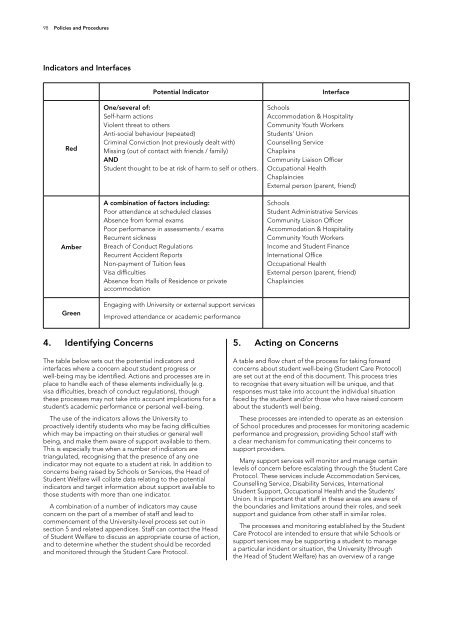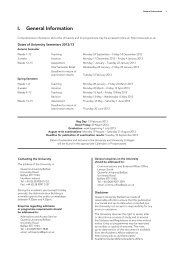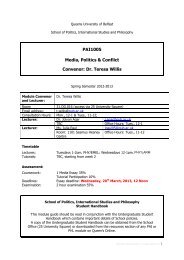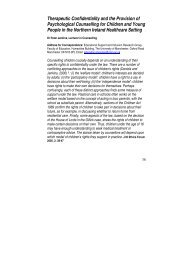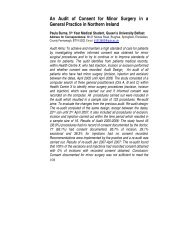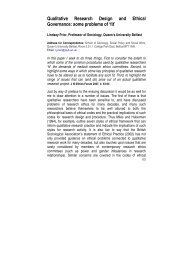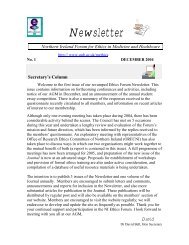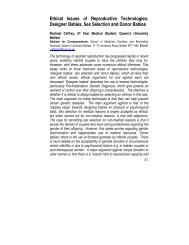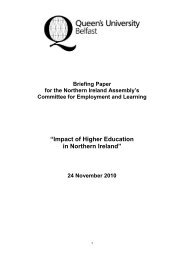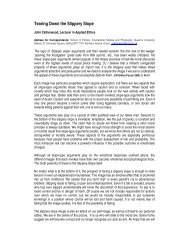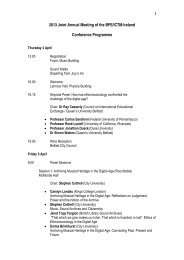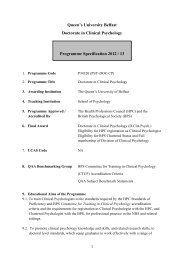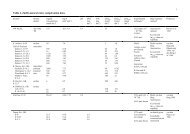University Calendar for Postgraduate Students 2012/13 - Queen's ...
University Calendar for Postgraduate Students 2012/13 - Queen's ...
University Calendar for Postgraduate Students 2012/13 - Queen's ...
Create successful ePaper yourself
Turn your PDF publications into a flip-book with our unique Google optimized e-Paper software.
98 Policies and Procedures<br />
Indicators and Interfaces<br />
Red<br />
Amber<br />
Green<br />
Potential Indicator<br />
One/several of:<br />
Self-harm actions<br />
Violent threat to others<br />
Anti-social behaviour (repeated)<br />
Criminal Conviction (not previously dealt with)<br />
Missing (out of contact with friends / family)<br />
AND<br />
Student thought to be at risk of harm to self or others.<br />
A combination of factors including:<br />
Poor attendance at scheduled classes<br />
Absence from <strong>for</strong>mal exams<br />
Poor per<strong>for</strong>mance in assessments / exams<br />
Recurrent sickness<br />
Breach of Conduct Regulations<br />
Recurrent Accident Reports<br />
Non-payment of Tuition fees<br />
Visa difficulties<br />
Absence from Halls of Residence or private<br />
accommodation<br />
Engaging with <strong>University</strong> or external support services<br />
Improved attendance or academic per<strong>for</strong>mance<br />
Interface<br />
Schools<br />
Accommodation & Hospitality<br />
Community Youth Workers<br />
<strong>Students</strong>’ Union<br />
Counselling Service<br />
Chaplains<br />
Community Liaison Officer<br />
Occupational Health<br />
Chaplaincies<br />
External person (parent, friend)<br />
Schools<br />
Student Administrative Services<br />
Community Liaison Officer<br />
Accommodation & Hospitality<br />
Community Youth Workers<br />
Income and Student Finance<br />
International Office<br />
Occupational Health<br />
External person (parent, friend)<br />
Chaplaincies<br />
4. Identifying Concerns<br />
The table below sets out the potential indicators and<br />
interfaces where a concern about student progress or<br />
well-being may be identified. Actions and processes are in<br />
place to handle each of these elements individually (e.g.<br />
visa difficulties, breach of conduct regulations), though<br />
these processes may not take into account implications <strong>for</strong> a<br />
student’s academic per<strong>for</strong>mance or personal well-being.<br />
The use of the indicators allows the <strong>University</strong> to<br />
proactively identify students who may be facing difficulties<br />
which may be impacting on their studies or general well<br />
being, and make them aware of support available to them.<br />
This is especially true when a number of indicators are<br />
triangulated, recognising that the presence of any one<br />
indicator may not equate to a student at risk. In addition to<br />
concerns being raised by Schools or Services, the Head of<br />
Student Welfare will collate data relating to the potential<br />
indicators and target in<strong>for</strong>mation about support available to<br />
those students with more than one indicator.<br />
A combination of a number of indicators may cause<br />
concern on the part of a member of staff and lead to<br />
commencement of the <strong>University</strong>-level process set out in<br />
section 5 and related appendices. Staff can contact the Head<br />
of Student Welfare to discuss an appropriate course of action,<br />
and to determine whether the student should be recorded<br />
and monitored through the Student Care Protocol.<br />
5. Acting on Concerns<br />
A table and flow chart of the process <strong>for</strong> taking <strong>for</strong>ward<br />
concerns about student well-being (Student Care Protocol)<br />
are set out at the end of this document. This process tries<br />
to recognise that every situation will be unique, and that<br />
responses must take into account the individual situation<br />
faced by the student and/or those who have raised concern<br />
about the student’s well being.<br />
These processes are intended to operate as an extension<br />
of School procedures and processes <strong>for</strong> monitoring academic<br />
per<strong>for</strong>mance and progression, providing School staff with<br />
a clear mechanism <strong>for</strong> communicating their concerns to<br />
support providers.<br />
Many support services will monitor and manage certain<br />
levels of concern be<strong>for</strong>e escalating through the Student Care<br />
Protocol. These services include Accommodation Services,<br />
Counselling Service, Disability Services, International<br />
Student Support, Occupational Health and the <strong>Students</strong>’<br />
Union. It is important that staff in these areas are aware of<br />
the boundaries and limitations around their roles, and seek<br />
support and guidance from other staff in similar roles.<br />
The processes and monitoring established by the Student<br />
Care Protocol are intended to ensure that while Schools or<br />
support services may be supporting a student to manage<br />
a particular incident or situation, the <strong>University</strong> (through<br />
the Head of Student Welfare) has an overview of a range


